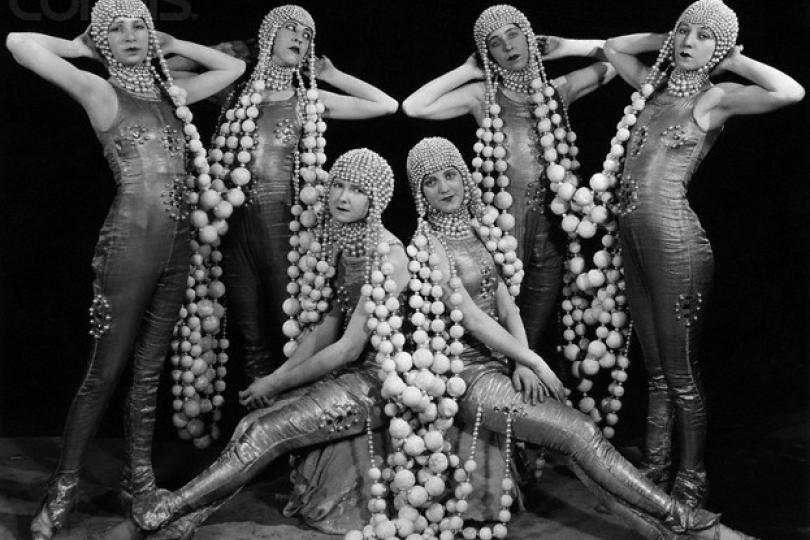Not Enough Hot Air

Harmless and mindless, Theatre of the Ridiculous and Absurd’s production of “Irving Berlin’s Music Box Revue 1921” at the Minnesota Masonic Heritage Center was a silly and carefree evening, but ultimately nothing to stand in line to see.
Even if you haven’t heard his name, you’ve definitely heard his music; Irving Berlin was one of twentieth-century America’s most notable songwriters and contributor to the Great American Songbook. Among his many titles, he was also the original owner of the Music Box Theatre on Broadway (currently housing “Dear Evan Hansen”) for which he wrote musical revues. “Irving Berlin’s Music Box Revue 1921” is the attempt at a re-creation of his 1921 revue.
A combination of larger music-and-dance numbers, with smaller numbers and/or skits in between, “Irving Berlin’s Music Box Revue 1921” surprisingly moves along at a fair clip, even for a modern Snapchat society. (In total, the show ran just over 2 hours, with a 20 minute intermission.) None of the skits or numbers carry much sustenance or subtlety, so there is not much to do other than bob along to the music or chortle at the tame innuendo.
As I tapped my toe along with Irving Berlin’s catchy melodies, I caught myself appreciating the form of the revue show--a light entertainment. In their heyday, they must have been something to behold with elaborate and elegant costumes, sumptuous scenery, and glitzy chorus girls. The Music Box Dancers and the Eight Little Notes (as the different girl groups are referred to in the program) were the highlight of the production and kept my attention each time they appeared on stage.
Although the chorus was my favorite performative aspect of the show, there were a few stand-out moments. Jennifer Rathsack was very funny in the ‘Monkey Business’ sketch and Alex Baily-Leither really hammed it up as Mickey in ‘School Days.’ Brandon A. Jackson was a standout singer and brought the house down with ‘The Schoolhouse Blues.’ Tim Kanaley stole the show as the Candy Butcher in ‘If You Don’t Want My Peaches.’ Finally, Andrew Engel as Irving Berlin was outstanding and the penultimate number (‘An Interview’) was my favorite number of the evening.
Fine performances aside, the finesse and refinement of Berlin’s original revues or Ziegfeld's Follies is the one element truly missing from Theatre of the Ridiculous and Absurd’s production. Wei Pai’s four piece band did well enough and balanced well with the performers, but sometimes sounded uncertain and timid. The costumes, which are not credited in the program, attempted to consider the 1920s period, but often missed the mark. And although the oyster headpiece and cigar were fun costumes that stood out, a few others inappropriately turned more towards burlesque and made me feel concerned for the actresses. Lighting, also uncredited, was serviceable and consisted mostly of lights up and lights down.
And you’ll have to forgive my scenic artist geek-out-moment, but I can’t not mention the authentic and historic drops (of which there were many!) provided by the Masonic Heritage Center Collection, which served as the unimportant backgrounds for the scenes. It was a pleasure and treat to see such beautiful craftsmanship on display and still in use.
As a piece, “Irving Berlin’s Music Box Revue 1921” is a bit like a balloon. Unless it’s inflated with a bunch of hot air, it’s not worth much. Director Doug Dally and the cast of twenty-two attempt to keep the balloon filled, but too often it deflates too far. Repetitive and predictable staging left a lot to be desired and the trepidatious cast could have used a few more rehearsals to brush up on their choreography. Too often, I wondered if the audience and I were laughing with the production, or at the production.
Theatre of the Ridiculous and Absurd’s production of “Irving Berlin’s Music Box Revue 1921” isn’t worth the price of admission when you consider what other quality shows you could see in the area for $23-$35. Despite this, it was evident that the cast was having a good time on stage and the audience hooted and hollered several times throughout the performance. At the end of the evening, I walked away happy to have been given some insight into what the glamorous revues of yesteryear must have been like.




